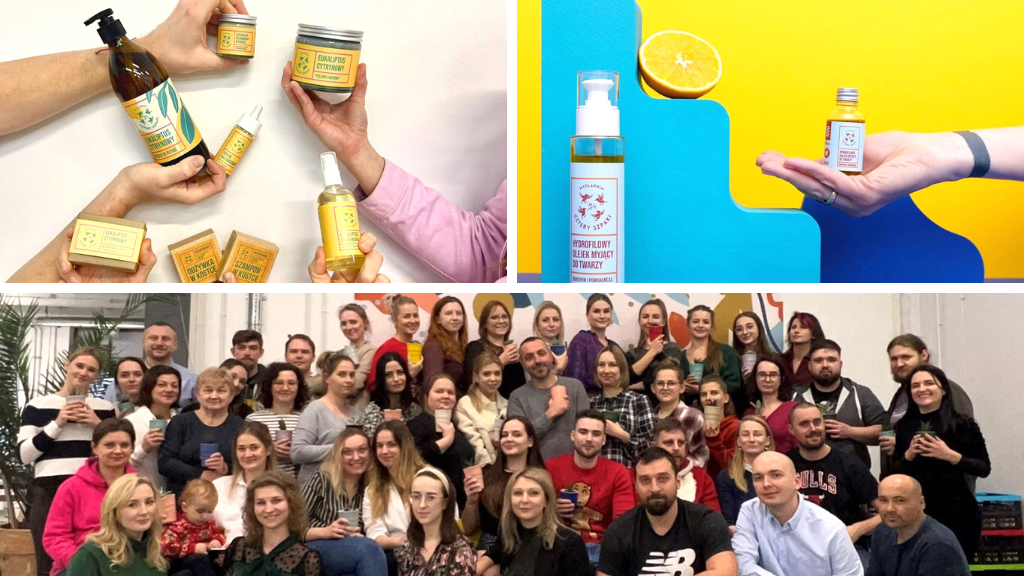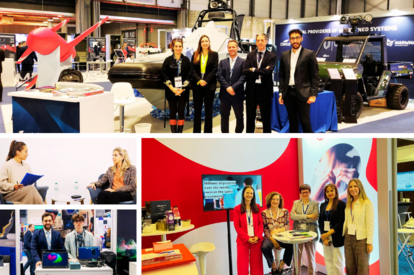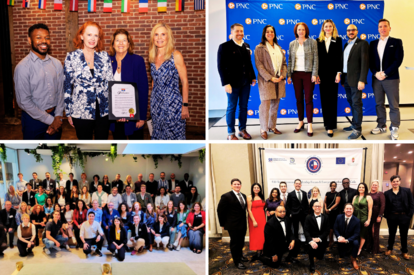
As clean beauty is reshaping the cosmetics landscape, Four Starlings – a family-owned soap-making business in Poland – is gaining international recognition. We spoke with Grzegorz Sienkiewicz, Managing Director of Four Starlings, and Anna Wrzesińska, Chief Specialist for International Cooperation at Podlaska Regional Development Foundation and Business Adviser at the Polish branch of Enterprise Europe Network, to find out how the Network helped turn this small company into a global success story.
Green is the new glam
Four Starlings, a family-owned soap business in Białystok, Poland, is leading the way in the rapidly growing natural cosmetics industry. As the sector expands, expected to reach a global market value of $38.8 billion by 2027, consumers are becoming more conscious of the risks posed by synthetic chemicals. They're choosing instead clean beauty products made from non-toxic, sustainable, and environmentally friendly ingredients. These products are not only rich in antioxidants, vitamins, and minerals but are also ethically sourced and produced with a strong focus on eco-friendly packaging and minimal waste.
While there is no single certification that confirms a product is natural or organic, major players in the industry have established their own guidelines. In Europe, common certification bodies include COSMOS, ECOCERT, and NATRUE. To make sure cosmetics are safe and high quality, the European Union has its own rules. For example, the Cosmetics Regulation 1223/2009 requires that all cosmetics sold in the EU must pass a safety assessment before they can be sold. They also need to be registered in the Cosmetic Products Notification Portal so any safety issues can be tracked quickly. Two EU bodies, the European Chemicals Agency (ECHA) and the European Union Reference Laboratory for Cosmetic Ingredients (EURL), help make sure companies follow these rules.
Because brands and retailers use different terms and standards, many consumers now spend more time researching products before they buy. According to Mintel’s 2023 Global Beauty and Personal Care Trends report, more shoppers are looking for effective products that are also sustainable.
A brand that walks the talk on sustainability
Four Starlings began in Podlasie, a region in Poland known as the "land by the forest." What started as a hobby for founders Magda and Tomek Kudaszewicz – making bar soaps for family and friends – has grown into a thriving business built on natural ingredients and traditional methods.
Inspired by the simplicity of Norwegian cosmetics, the couple wanted to create personal care products that are gentle on the skin and kind to the planet. “From the beginning, even before clean beauty was a trend, we followed our own strong values,” says Grzegorz Sienkiewicz, Managing Director of Four Starlings. “Our products are natural, vegan, and made with essential oils, so they’re safe for the whole family.”
Sustainability is at the heart of everything they do. The company uses eco-friendly materials like paper, aluminum, and glass for packaging and follows a zero-waste approach in production. “Our products are not just effective,” adds Grzegorz, “they also support global sustainability goals that protect the planet and promote well-being.” Four Starlings also leads social campaigns that support people, animals, and the environment.
As demand grew, so did their product range. The brand now offers over 100 items, from bar and liquid soaps to deodorants, face creams, body oils, scrubs, soy candles, and more. Their products are sold in Poland and across Europe, as well as in Switzerland, Norway, the UK, and Japan.
Even with this rapid growth, the company has stayed true to its roots. All products are still made by hand, just as they were in the beginning. But growing sustainably on a global scale also meant finding the right partners and funding. That’s when Four Starlings turned to Enterprise Europe Network for support.
How the Network helped Four Starlings enter new markets
To diversity their markets, the company sought guidance from the Network through the Podlaska Regional Development Foundation (PRDF), a non-profit with over 27 years of experience supporting businesses in the region. The company worked closely with the PRDF and the Polish Investment and Trade Agency to get export-ready, hire staff, adjust their offerings, and identify target markets. They considered factors like global beauty product imports, population size, GDP per capita, trends, and how well their products matched local demands. Ultimately, they chose five countries for expansion: the Czech Republic, Slovakia, Lithuania, Spain, and Singapore. PRDF’s advisors helped the company craft an internationalisation plan, assess markets, and develop marketing ideas. "The networking support also allowed us to tailor our products to local needs," said Sienkiewicz.
With support from the Network, Four Starlings secured funding from the Polish Agency for Enterprise Development to support their internationalisation efforts. This funding allowed them to purchase manufacturing equipment, train staff, obtain the Good Manufacturing Practice (GMP) certificate, and attend major international trade events, including COSMOPROF in Bologna, Italy, one of the largest events in the global cosmetics industry. Anna Wrzesińska, Chief Specialist for International Cooperation at the PRDF and Business Adviser at Enterprise Europe Network, highlighted that attending such events gave Four Starlings valuable opportunities to network. "While virtual meetings are convenient, nothing beats face-to-face interactions," Sienkiewicz added.
The Network’s business experts also helped Four Starlings overcome challenges during their internationalisation process. For example, PRDF connected them with a Finnish supplier of high-quality birch tar, a key ingredient for their cosmetics. These connections helped the company produce premium products for both local and global markets. Another example is their participation in the Cosmobeauté Malaysia fair in 2022, a key event for entering Asian markets. "This fair was a turning point for us. We were already in Japan, so Southeast Asia became our next focus. The Polish Investment and Trade Agency's support helped us meet important industry contacts. It was an incredible experience," said Sienkiewicz.
Small businesses interested in the natural and organic cosmetics world can learn a lot from Four Starlings. Wrzesińska advises aspiring entrepreneurs to start with a strong business plan that includes a clear mission, goals, target market, and financial projections. Market research is crucial for understanding customer needs and competition, and a reliable supply chain for ingredients and packaging is essential. Entrepreneurs should also develop a comprehensive marketing strategy and keep their plan updated as the market and business goals evolve.
For Sienkiewicz, the key to success is courage. "The world belongs to the brave," he said. "Chase your dreams, stay committed, and don't fear rejection or failure. Innovative ideas often face resistance at first, like our bar shampoos and cream deodorants, which were among the first of their kind in Poland. Now, we’re proud to lead in this area. The Network’s support has played a huge role in our success."
Anna Wrzesińska is the Chief Specialist for International Cooperation at Podlaska Regional Development Foundation and a Business Advisor for SME Internationalisation at Enterprise Europe Network.
Related articles

In a world of saturated markets and shrinking attention spans, innovative SMEs must go beyond great products: they need smart, strategic communication to succeed globally. Discover five powerful tips...

Starting a business on a tight budget? You don’t need a huge marketing budget to see real results. In this article, we’ll share 4 affordable marketing strategies for small businesses, showing you how...

Is Texas your next big opportunity? You’re probably thinking of sizzling fajitas, rugged cowboys, or the sweet sound of Willie Nelson strumming his guitar. Well, Texas has all of that, but it’s also...

Start-ups need funding, mentorship, and networks to scale. Big companies are looking for fresh ideas, disruptive tech, and faster ways to stay ahead. When they join forces, both sides win. Keep...
